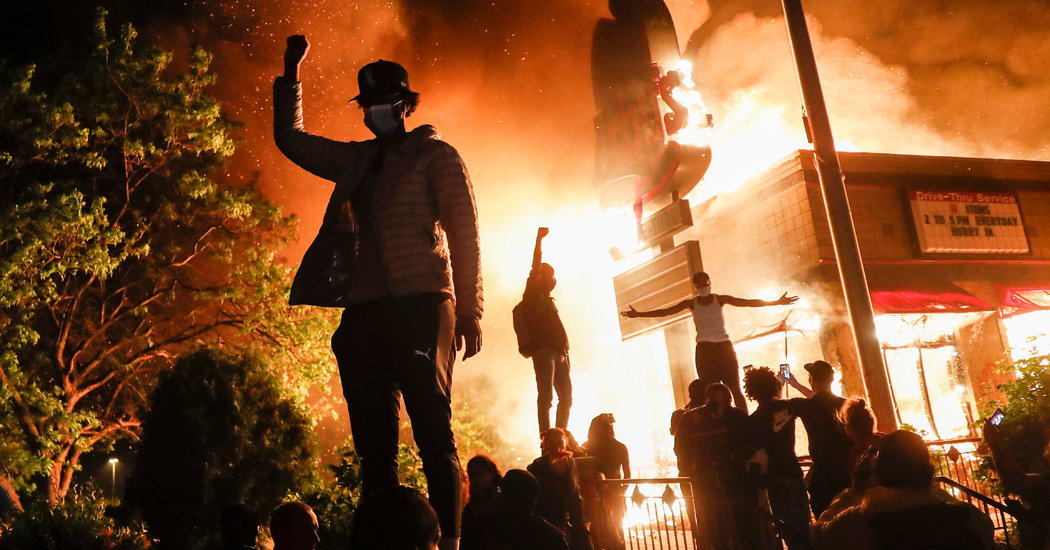There are videos of Eric Garner and George Floyd being choked to death by police officers while pleading for their lives. There is a video of Tamir Rice, a 12-year-old boy who was shot to death while playing with a toy gun. There is a video of Ahmaud Arbery, who was hunted and killed while out on a run. There is a video of a police officer mounting and handcuffing Dajerria Becton, 15 years old at the time, at a pool party.
Visible evidence of black suffering is not new. We have photographs of black lynchings. The screams of black voices and the smell of charred flesh was insufficient to mar the smiling poses gathered ’round our corpses.
The videos are a reminder that the issue was never about a lack of evidence. They reveal the lengths to which those in power will go to avoid facing the truth. What is happening in those videos is a manifestation of systemic racism — and to acknowledge that would call into question the system that benefits the powerful.
When these videos stack one upon another and are added to our personal slights, a deep unsettling anger rises in the soul of a disinherited and beleaguered people. James Baldwin said, “To be a Negro in this country and to be relatively conscious is to be in a rage almost all the time.”
What is the focus of our rage? Are we upset with the police officer who placed his knee on the neck of a man pleading for his life for nearly nine minutes while three fellow officers looked on? Are we mad at the vigilantes who got in a pickup truck to hunt down an unarmed black man? Are we enraged by the white woman who tried to weaponize the police by claiming that a black man who requested that she leash her dog in Central Park was threatening her life? Are we frustrated by the laws and customs that cast a pall over the black experience? Are we wearied with the apathy of so many?
The Bible is not silent about the rage of the oppressed. One of the most startlingly violent passages in the Bible comes from the lips of the disinherited. In Psalm 137 the psalmist says, “Daughter Babylon, doomed to destruction, happy is the one who repays you according to what you have done to us. Happy is the one who seizes your infants and dashes them against the rocks.”
How can wishing such an atrocity be in any sense a religious text? Psalm 137 is a psalm of the traumatized. It depicts the aftermath of the destruction of Jerusalem, the sack of the city, sexual assault and brutalization of the innocent. What kind of song do you write if you are forced to watch the murder of your wife, your child, your neighbor?
Psalm 137 is trauma literature, the rage of those who lived. The question isn’t why the Psalmist wrote this. The question is what kind of song would the families of Ahmaud Arbery, George Floyd and Eric Garner be tempted to write after watching the video of their deaths? It would be raw and unfiltered. But more than an expression of rage, this psalm is a written record in time. It is a call to remember. This psalm, and the other psalms of rage, require us to remember the trauma that led to their composition.
The miracle of the Bible is not that it records the rage of the oppressed. The miracle is that it has more to say. The same texts that include a call for vengeance upon Israel’s enemies look to the salvation of its oppressors. Isaiah 49 says, “It is too small a thing for you to be my servant to restore the tribes of Jacob and bring back those of Israel I have kept. I will also make you a light for the Gentiles, that my salvation may reach to the ends of the earth.”
For Christians, rage (Psalm 137) must eventually give way to hope (Isaiah 49). And we find the spiritual resources to make this transition at the cross. Jesus could have called down the psalms of rage upon his enemies and shouted a final word of defiance before he breathed his last. Instead he called for forgiveness: “Father, forgive them, for they do not know what they are doing,” he says in Luke 23.
It was not a false reconciliation: Jesus experienced the reality of state-sponsored terror. That is why the black Christian has always felt a particular kinship with this crucified king from an oppressed ethnic group. The cross helps us make sense of the lynching tree.
And Jesus’ resurrection three days after his crucifixion shows that neither the lynching tree nor the cross have the final say about those whom God values. The state thought that violence could stop God’s purposes. For the Christian, the resurrection makes clear the futility of the attempt. Further, Jesus’ profound act of forgiving his opponents provides me with the theological resources to hope.
Dare we speak of hope when chants of “I can’t breathe” echo in the streets? Do we risk the criticism commonly levied at Christians that we move too quickly to hope because faith pacifies? Resurrection hope doesn’t remove the Christian from the struggle for justice. It empties the state’s greatest weapon — the fear of death — of its power.
Hope is possible if we recognize that it does not rule out justice. It is what separates justice from vengeance. Howard Thurman wrote in his classic work “Jesus and the Disinherited” about how rage, once unleashed, tends to spill out beyond its intended target and consume everything. The hatred of our enemy that we take to the streets returns with us to our friendships, marriages and communities. It damages our own souls.
Christians contend for justice because we care about black lives, families and communities. We contend for reconciliation after the establishment of justice because there must be a future that is more than mutual contempt and suspicion. But justice and reconciliation cannot come at the cost of black lives. The only peaceful future is a just future. And because Christians should be a people for peace, we must be a people for justice even when it seems ever to elude us. Too many black lives have been lost to accept anything else.
Esau McCaulley (@esaumccaulley) is an assistant professor of New Testament at Wheaton College and a priest in the Anglican Church in North America, where he serves as the director of the Next Generation Leadership Initiative. He is the author of the forthcoming book “Reading While Black: African American Biblical Interpretation as an Exercise in Hope,” from which this essay is adapted.
The Times is committed to publishing a diversity of letters to the editor. We’d like to hear what you think about this or any of our articles. Here are some tips. And here’s our email: [email protected].
Follow The New York Times Opinion section on Facebook, Twitter (@NYTopinion) and Instagram.



















